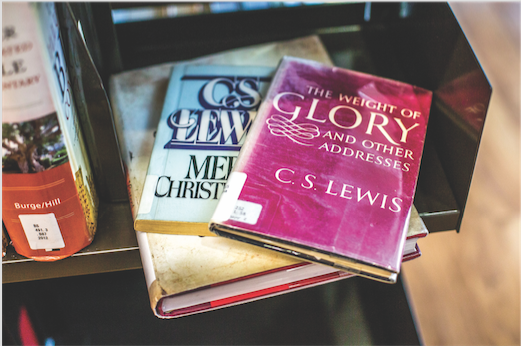Students explore Narnia and Middle-earth philosophies in integrative courses
Students interested in the more offbeat courses their school has to offer need not look very far — Liberty University offers students a variety of unique options
each semester.
Some of these options lie hidden in the most unlikely departments like Liberty’s department of philosophy.
For undergraduate students, philosophy classes are mandatory general education classes that they must take to fulfill their degree plan.
But what many students do not know is that while the department of philosophy offers the basics like introduction to philosophy, ethics and logic, it also offers two courses that are less mainstream: The Thought of C.S. Lewis (PHIL 465) and The Thought of J.R.R. Tolkien (PHIL 468).
Both courses are integrative, meaning their enrollment is open to students of all majors and no previous experience with philosophy courses is required.
According to Dr. Edward Martin, professor of philosophy and instructor of PHIL 465, 80 to 90 percent of the students who take one or both of these courses have no association with the department of philosophy.
Martin said the courses often attract students studying the fields of English, humanities and biblical studies as well as students who discovered and fell in love with Tolkien and Lewis’ books as children.
“It’s no surprise that story and narrative have always, and will continue to, fire our imagination,” Martin said.
“Tolkien and Lewis are masters of story, and their works give us delightful and memorable insight into the Christian worldview.”
According to Dr. Thomas Provenzola, professor of philosophy and instructor of PHIL 468, these courses present students with perspectives not often found in traditional philosophy classes by adding more flavor to what he calls the academic diet.
“One of the best ways to convey deep philosophical points is to put them into a story,” Provenzola said.
“It shows us the powerful place of imagination in the human condition and reminds us that we can create worlds that are true and beautiful and robust. That is our right,
by design.”
In a survey conducted by Christianity Today of the most spiritually impactful books of the 20th century and beyond, “Mere Christianity” and “The Screwtape Letters” by C.S. Lewis and “The Lord of The Rings” by J.R.R. Tolkien ranked among the top 10.
In PHIL 465 and 468, students are given an in-depth look at these books and other classics written by their authors and the messages that lie beneath the surface.
“We never outgrow the need for story,” Provenzola said.
“As Tolkien tries to show us, as we grow older, the purpose is not to move away from imagination and wonder … but to come back to it.”
Provenzola said he considers himself to be as Gandalf is to Bilbo and Frodo in Tolkien’s Middle-earthen tales — a facilitator of the journey and adventure his course holds for students.
One of the unique twists of PHIL 465 and 468 is that both courses give students an equal balance of lecture and open-forum discussion, beginning with the basics and building to the greater depths and insights of Tolkien and Lewis’ thoughts and worldviews.
“Knowing the background behind the surface emphasizes the meaning and makes the experience come alive all the more,” Martin said.
“With the discussions we’re able to sharpen each other about the bigger picture.”
Opportunities to bring the content of PHIL 465 and PHIL 468 to life in such ways abound in the classrooms on campus and abroad.
According to Martin, a C.S. Lewis-themed trip is planned to take place during spring break 2018.
Students participating in the trip will venture to Northern Ireland, London, Cambridge and Oxford, exploring the life and retracing the steps of C.S. Lewis.
Like the Lewis and Tolkien courses, the 11-day trip is open to all majors and may provide philosophy and cultural studies credit.
“My hope for students who take these courses is that the courses will broaden students’ horizons in their own fields of study,” Provenzola said.
Estes is a feature reporter.

Janie Baines
April 6, 2017
Great article, Rachel! I would have enjoyed a class like this so much. It’s exciting to see that Liberty is now incorporating Lewis & Tolkien into their Philosophy courses; in my opinion, both writers have contributed a great deal to Christian literature.